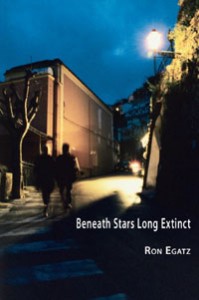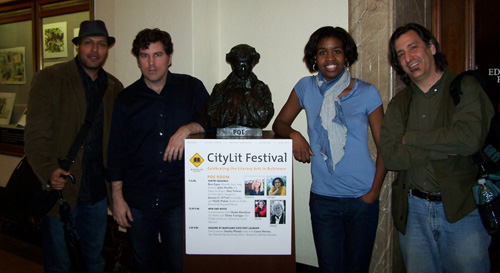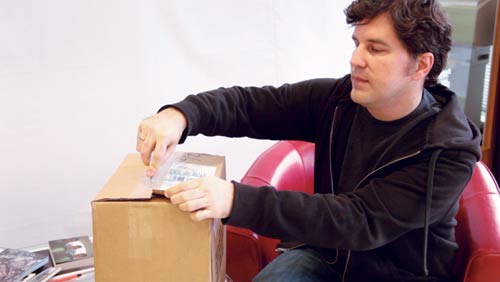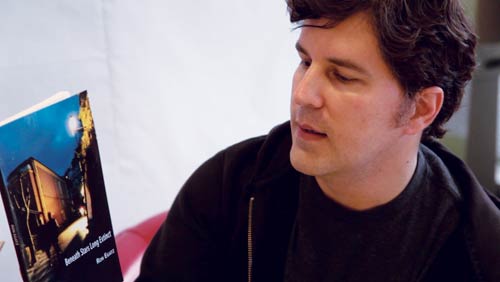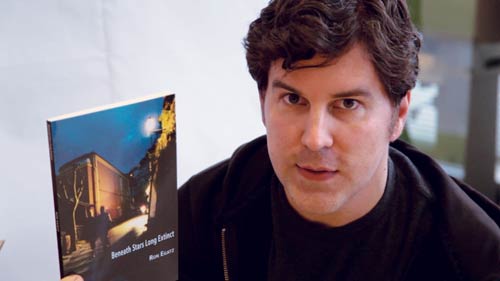Michael Zinkowski’s UNCG Egatz Introduction
Michael Zinkowski of the University of North Carolina Greensboro was kind enough to introduce me when I read there on 23 April 2010. Knowing my work for only two weeks before the reading, he poured over galley pages of Beneath Stars Long Extinct as the book was being printed and bound. He’s allowed me to reprint his remarks here.
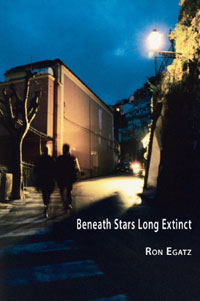 The last line of Red Hen Press’s summary of Ron Egatz’s Beneath Stars Long Extinct describes the collection as “a rally cry for poetry unafraid of being understood, yet not sacrificing lyric quality, music, or emotional depth.” I begin my introduction with this particular passage because I find it an impassioned, accurate, and yet peculiar description of Ron’s work.
The last line of Red Hen Press’s summary of Ron Egatz’s Beneath Stars Long Extinct describes the collection as “a rally cry for poetry unafraid of being understood, yet not sacrificing lyric quality, music, or emotional depth.” I begin my introduction with this particular passage because I find it an impassioned, accurate, and yet peculiar description of Ron’s work.
If this is indeed a rally cry, as Red Hen Press states, then consider me marching alongside, Molotov cocktails in hand. While I admit I’d never read any of Ron’s poems before two weeks ago, I am grateful for having been introduced. As a testament to Ron’s craftwork as a lucid, tangible and all-the-while richly imaginative poet, I picked up, for the second time, the 107-page stack of office-copied poems immediately after reading it for the first time. I experienced no post-reading panic – the one when you realize you’ve scanned and gained nothing from an hour and a half of your life. Instead, I wanted more.
In his interview with Poetry Out Loud, Ron states, “Lucid but deep poetry is my crusade.” Beneath Stars is a worthy holy grail, Ron’s eighth book in 25 years, and the first to be published.
Responding to the question: What will change now that you have a book published, Ron states “The most I can hope for is a wider audience, which is certain to happen, as my audience now is largely my curious following of supporters who show up at New York-area readings. I’m lucky to have them. A friend of mine calls them FoEs. Friends of Egatz.”
I’m quite certain that after his reading, we’ll all want, much like I did upon my first reading, to hear it all over again, to relive tangible pieces like “First Motor Vehicle Fatality in America,” “The One” or my favorite “Heartworm and the Space Behind” in which a hunting dog, too loyal, loving and excited, doesn’t know she’s about to be put down. In fact, after reading that poem I wrote in the margin, “God damn….” in one of those breathtaking moments where you feel immensely sad and crushed by exactly what the poet leaves out, by the dog’s tragic unknowing, by the inevitability of death, loss and how we let go of those missing pieces of our selves we still love. I’m also quite certain that we’ll all want to join the FoEs community, even if we can’t promise to relocate to New York.
Finally, let me return to why I believe that original statement (for those who forgot “a rally cry for poetry unafraid of being understood, yet not sacrificing lyric quality, music, or emotional depth”) is so peculiar. To assume that one would ever have to sacrifice lyric quality, music or emotional depth in lucid poetry is misguided at best. That IS the assumption. You can’t have tangible poems that sing, or so the myth goes. However, Ron’s poetry understands that this doesn’t have to be true. His poems do rally and renew the readers’ enthusiasm for poetry that is lucid necessarily because of its lyric quality, music and emotional depth, poetry where there can be a positive 1.0 correlation between these qualities and the poet’s ability to grab hold of a reader and show them something that expands their humanity.
